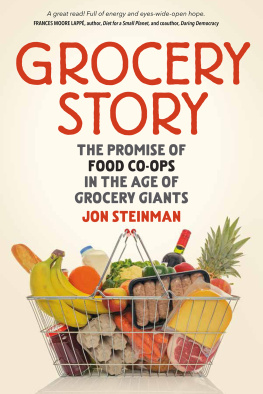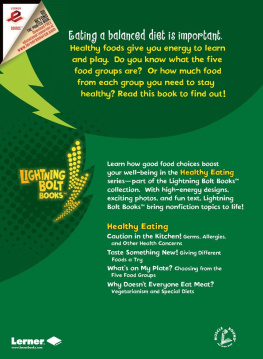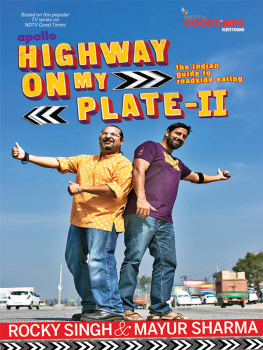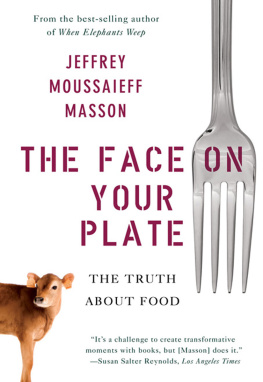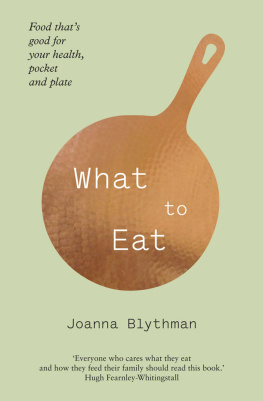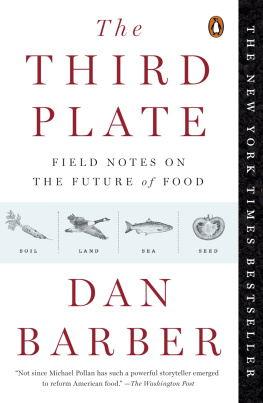Dan Barber - The Third Plate: Field Notes on the Future of Food
Here you can read online Dan Barber - The Third Plate: Field Notes on the Future of Food full text of the book (entire story) in english for free. Download pdf and epub, get meaning, cover and reviews about this ebook. year: 2014, publisher: Penguin Press HC, The, genre: Detective and thriller. Description of the work, (preface) as well as reviews are available. Best literature library LitArk.com created for fans of good reading and offers a wide selection of genres:
Romance novel
Science fiction
Adventure
Detective
Science
History
Home and family
Prose
Art
Politics
Computer
Non-fiction
Religion
Business
Children
Humor
Choose a favorite category and find really read worthwhile books. Enjoy immersion in the world of imagination, feel the emotions of the characters or learn something new for yourself, make an fascinating discovery.

- Book:The Third Plate: Field Notes on the Future of Food
- Author:
- Publisher:Penguin Press HC, The
- Genre:
- Year:2014
- Rating:4 / 5
- Favourites:Add to favourites
- Your mark:
The Third Plate: Field Notes on the Future of Food: summary, description and annotation
We offer to read an annotation, description, summary or preface (depends on what the author of the book "The Third Plate: Field Notes on the Future of Food" wrote himself). If you haven't found the necessary information about the book — write in the comments, we will try to find it.
At the heart of todays optimistic farm-to-table food culture is a dark secret: the local food movement has failed to change how we eat. It has also offered a false promise for the future of food. Our concern over factory farms and chemically grown crops might have sparked a social movement, but chef Dan Barber reveals that even the most enlightened eating of today is ultimately detrimental to the environment and to individual health. And it doesnt involve truly delicious food. Based on ten years of surveying farming communities around the world, Barbers The Third Plate offers a radical new way of thinking about food that will heal the land and taste good, too.
The Third Plate is grounded in the history of American cuisine over the last two centuries. Traditionally, we have dined on the first plate, a classic meal centered on a large cut of meat with few vegetables. Thankfully, thats become largely pass. The farm-to-table movement has championed the second plate, where the meat is from free-range animals and the vegetables are locally sourced. Its better-tasting, and better for the planet, but the second plates architecture is identical to that of the first. It, too, is damagingdisrupting the ecological balances of the planet, causing soil depletion and nutrient lossand in the end it isnt a sustainable way to farm or eat.
The solution, explains Barber, lies in the third plate: an integrated system of vegetable, grain, and livestock production that is fully supportedin fact, dictatedby what we choose to cook for dinner. The third plate is where good farming and good food intersect.
While the third plate is a novelty in America, Barber demonstrates that this way of eating is rooted in worldwide tradition. He explores the time-honored farming practices of the southern Spanish dehesa, a region producing high-grade olives, acorns, cork, wool, and the renowned jamn ibrico. Off the Straits of Gibraltar, Barber investigates the future of seafood through a revolutionary aquaculture operation and an ancient tuna-fishing ritual. In upstate New York, Barber learns from a flourishing mixed-crop farm whose innovative organic practices have revived the land and resurrected an industry. And in Washington State he works with cutting-edge seedsmen developing new varieties of grain in collaboration with local bakers, millers, and malt makers. Drawing on the wisdom and experience of chefs and farmers from around the world, Barber builds a dazzling panorama of ethical and flavorful eating destined to refashion Americans deepest beliefs about food.
A vivid and profound work that takes readers into the kitchens and fields revolutionizing the way we eat, The Third Plate redefines nutrition, agriculture, and taste for the twenty-first century. The Third Plate charts a bright path forward for eaters and chefs alike, daring everyone to imagine a future for our national cuisine that is as sustainable as it is delicious.
The Wall Street Journal
[F]un to read, a lively mix of food history, environmental philosophy and restaurant lore... an important and exciting addition to the sustainability discussion.
The Atlantic
When The Omnivores Dilemma, Michael Pollans now-classic 2006 work, questioned the logic of our nations food system, local and organic werent ubiquitous the way they are today. Embracing Pollans iconoclasm, but applying it to the updated food landscape of 2014, The Third Plate reconsiders fundamental assumptions of the movement Pollans book helped to spark. In four sectionsSoil, Land, Sea, and SeedThe Third Plate outlines how his pursuit of intense flavor repeatedly forced him to look beyond individual ingredients at a regions broader storyand demonstrates how land, communities, and taste benefit when ecology informs the way we source, cook, and eat.
Dan Barber: author's other books
Who wrote The Third Plate: Field Notes on the Future of Food? Find out the surname, the name of the author of the book and a list of all author's works by series.

